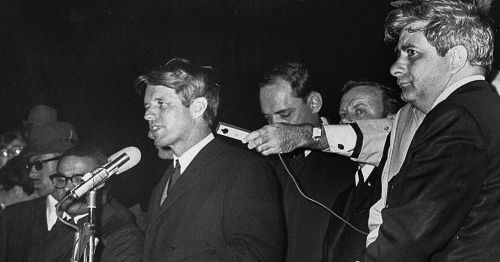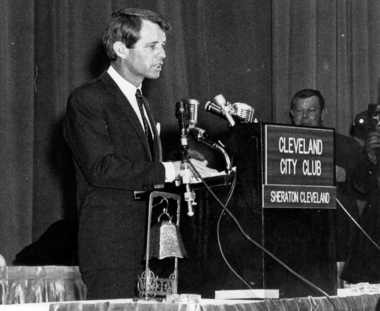
Fifty years ago, on April 4, 1968, Rev. Martin Luther King Jr. was murdered on the balcony of his hotel room in Memphis, Tennessee. Around the same time, Robert F. Kennedy — U.S. senator, former attorney general, brother of assassinated president John F. Kennedy, and presidential candidate – was on his way to a campaign event in Indianapolis, Indiana when he received word of King’s assassination. Kennedy’s relations with the Civil Rights Movement and the black community in general had moved from frustratingly bad in 1963 to unprecedentedly good in 1968, based in large part on Kennedy’s willingness to listen to what black activists and leaders were telling him along with his use of federal resources against white supremacists in the South. By 1968 despite all his limitations in being able to fully understand African-American experiences, Civil Rights leaders and black Americans were largely confident that Bobby Kennedy really wanted to help them in their struggle for equality. As such, after arriving in Indianapolis Kennedy was warned by the chief of police that it would be too dangerous for him to proceed to an outdoor rally he had planned in a predominately black inner-city neighborhood. Kennedy disagreed and went anyway, speaking extemporaneously for a few minutes to a crowd of about one thousand people.
 Robert Kennedy speaking in Indianapolis, April 4, 1968
Robert Kennedy speaking in Indianapolis, April 4, 1968
Tensions were understandably high all over the United States with riots breaking out in dozens of cities over the country, but Kennedy stressed that it was a mistake to answer senseless violence with more anger and hate. In a particularly poignant moment, Kennedy addressed publicly for the first time his brother’s assassination five years earlier, remarking that “For those of you who are black and are tempted to be filled with hatred and distrust at the injustice of such an act, against all white people, I can only say that I feel in my own heart the same kind of feeling. I had a member of my family killed, but he was killed by a white man. But we have to make an effort in the United States, we have to make an effort to understand, to go beyond these rather difficult times.” Earlier in his speech Kennedy further stated that “we can make an effort, as Martin Luther King did, to understand and to comprehend, and to replace that violence, that stain of bloodshed that has spread across our land, with an effort to understand with compassion and love.” In response to his speech, Indianapolis saw no riots in the aftermath of MLK’s assassination.
Kennedy suspended his campaign until King could be buried but decided to continue on to Cleveland, Ohio to keep one of his planned appearances – this time to the affluent, white members of the Cleveland City Club on April 5. His remarks were brief, lasting about ten minutes, and his speech was mostly overlooked at the time, but in it he gives insights that are just as relevant today as they were fifty years ago.
 Kennedy speaking to Cleveland City Club, April 5, 1968
Kennedy speaking to Cleveland City Club, April 5, 1968
Kennedy began by saying that “This is a time of shame and sorrow. It is not a day for politics. I have saved this one opportunity to speak briefly to you about this mindless menace of violence in America which again stains our land and every one of our lives.” For him, the assassination of Martin Luther King was yet another incident in the division and suffering in the United States that had started with his brother’s murder in 1963 and had only increased in the following years. Kennedy proclaimed that “Whenever any American’s life is taken by another American unnecessarily – whether it is done in the name of the law or in the defiance of law, by one man or a gang, in cold blood or in passion, in an attack of violence or in response to violence – whenever we tear at the fabric of life which another man has painfully and clumsily woven for himself and his children, the whole nation is degraded.” He continued that “we seemingly tolerate a rising level of violence that ignores our common humanity and our claims to civilization alike… We make it easy for men of all shades of sanity to acquire weapons and ammunition they desire.” Furthermore, he concluded these initial reflections with his view that “Too often we honor swagger and bluster and the wielders of force; too often we excuse those who are willing to build their own lives on the shattered dreams of others,” and that “Some look for scapegoats, others look for conspiracies, but this much is clear; violence breeds violence, repression brings retaliation, and only a cleaning of our whole society can remove this sickness from our soul.”
Kennedy’s remarks up to this point in his speech commented on the physical violence that was plaguing the United States, but he continued by addressing something that few white politicians ever had. He told his audience that “there is another kind of violence, slower but just as deadly, destructive as the shot or the bomb in the night. This is the violence of institutions; indifference and inaction and slow decay. This is the violence that afflicts the poor, that poisons relations between men because their skin has different colors.” He further explained that “This is the breaking of a man’s spirit by denying him the chance to stand as a father and as a man among other men. And this too afflicts us all… When you teach a man to hate and fear his brother, when you teach that he is a lesser man because of his color or his beliefs or the policies he pursues, when you teach that those who differ from you threaten your freedom or your job or your family, then you also learn to confront others not as fellow citizens but as enemies – to be met not with cooperation but with conquest, to be subjugated and mastered.”
Kennedy acknowledged that this intuitional and societal racism was morally untenable, but that there were no quick or easy solutions. He realized that the “question is whether we can find in our own midst and in our own hearts that leadership of human purpose that will recognize the terrible truths of our existence” and warned that “We must admit the vanity of our false distinctions among men and learn to find our own advancement in the search for the advancement of all. We must admit in ourselves that our own children’s future cannot be built on the misfortunes of others. We must recognize that this short life can neither be ennobled or enriched by hatred or revenge.” Finally, he affirmed that “Our lives on this planet are too short and the work to be done too great to let this spirit flourish any longer in our land” and that “we can perhaps remember – even if only for a time – that those who live with us are our brothers, that they share with us the same short movement of life, that they seek – as we do – nothing but the chance to live out their lives in purpose and happiness, winning what satisfaction and fulfillment they can.” For Kennedy, “Surely this bond of common faith, this bond of common goal, can begin to teach us something. Surely we can learn, at least, to look at those around us as fellow men and surely we can begin to work a little harder to bind up the wounds among us and to become in our hearts brothers and countrymen once again.”
Kennedy’s two speeches, given on subsequent days in April of 1968 to two quite different groups – the first to black Americans who were reeling from the loss of one of their greatest leaders, the second to white campaign donors who paid to hear him talk about why he should be president – offer a glimpse into a unique man’s ability to relate to a wide range of people. His work as attorney general in support of Civil Rights activists and the personal tragedy he went through when his brother was assassinated helped him to achieve a level of trust among black Americans unheard of among other white politicians, and his family connections and privileged upbringing cemented his credentials among America’s wealthy, white elite. Kennedy found a way to talk to and with both groups as he helped black Americans to see that their cause was not lost among white Americans, even in the wake of Martin Luther King’s assassination, and as he reminded white Americans that their fates were intertwined with those of their fellow Americans, regardless of skin color, and that the United States’ current system of institutionalized racism and exploitation was detrimental to all in the long run, no matter how much it might have benefitted them in the short term. Robert Kennedy was assassinated in June of 1968 and thus never lived to further promote his views of tolerance and social reform, but his two speeches from fifty years unfortunately continue to be relevant to us today while racism — both individual and systemic — are still problems, when gun violence still ends the lives of people whose full potential will never be known, and when some individuals would continue to espouse fear and cruelty to preserve a system that benefits them to the harm of so many others. Kennedy was far from a perfect man or politician, but he saw that what harms any of us, harms all of us and that we must all work together for peace or continue to suffer in our divisions.
References:
Larry Tye, “The Most Trusted White Man in Black America,” Politico, July 7, 2016. https://www.politico.com/magazine/story/2016/07/robert-f-kennedy-race-relations-martin-luther-king-assassination-214021
Robert F. Kennedy, “Statement on Assassination of Martin Luther King, Jr., Indianapolis, Indiana, April 4, 1968,” John F. Kennedy Presidential Library and Museum. https://www.jfklibrary.org/Research/Research-Aids/Ready-Reference/RFK-Speeches/Statement-on-the-Assassination-of-Martin-Luther-King.aspx
Robert F. Kennedy, “Remarks to the Cleveland City Club, April 5, 1968,” John F. Kennedy Presidential Library and Museum. https://www.jfklibrary.org/Research/Research-Aids/Ready-Reference/RFK-Speeches/Remarks-of-Senator-Robert-F-Kennedy-to-the-Cleveland-City-Club-Cleveland-Ohio-April-5-1968.aspx